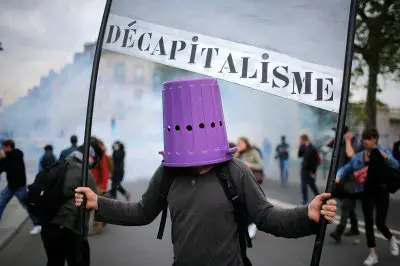Despite growing public anger, French President Francois Hollande on Tuesday stood firm to pass through the controversial labor reform and to maintain its "principles" which grant companies more flexibility to negotiate work conditions.
"The bill will not be withdrawn. The principles of Article 2 will be kept," Hollande told the regional newspaper Sud-Ouest.
Asked if he would pass the reform into law by decree, the Socialist leader said "I would prefer that the text be adopted without having to do so, but not at the price of abandoning it."
Earlier this month, Prime Minister Manuel Valls had resorted to a 49-3 decree, to push through the law without a parliament vote.
Surviving no-confidence vote, the government won the first round of a legislative battle to adopt the bill which automatically pass their first reading in the National Assembly.
The government has the right to use the same decree to pass the text in following readings.
Addressing socialist lawmakers at the lower house of parliament, Valls earlier on Tuesday stressed that "retreating will be a political error." He also vowed to keep unchanged "the core of the text," referring to the provision which gives more power to enterprises to negotiate pay and working conditions.
Rebuffing critics of being pro-business, the Socialist government said its proposal to soften labor rules would encourage companies to hire more by reducing overtime pay and economic redundancies and opening to negotiation working hours and holidays.
Seeing the other face of the coin, labor unions, notably the CGT, pledged to intensify protests and strikes "till the end, till the withdraw of the reform."
Amid worsening showdown, trade unions are planning to plunge the country's transport services into chaos, following many strikes in air, rail and metro services, unless French officials withdraw the law.
A rolling rail strike is set to start later on Tuesday. The state-run railway company SNCF said the movement was expected to halt services of TGV lines, with six high-speed trains out of ten to operate, and to disrupt up to two-thirds of regional services.
Bus and metro workers will start an open-ended strike on Thursday, raising concerns of travel chaos few days ahead the European soccer tournament Euro 2016 scheduled for June 10.
As for air traffic, the aviation authorities (DGCA) expected flights cancellation due to two-day strike from June 3 of DGCA staff who demand better work conditions.
Meanwhile, anti-labor reform action was extended to oil terminals in Marseille and Le Havre, which provide kerosene to Paris main two airports Orly and Charles de Gaulle.
Only two French refineries out of eight are operating normally. However, petrol supply has been improved after police unblocked oil depots, with 20 percent of the country's 12,500 petrol stations out of fuel, according to French Union of Petroleum Industries (UFIP).
The final vote of the contested labor reform bill is set for July.
 简体中文
简体中文

